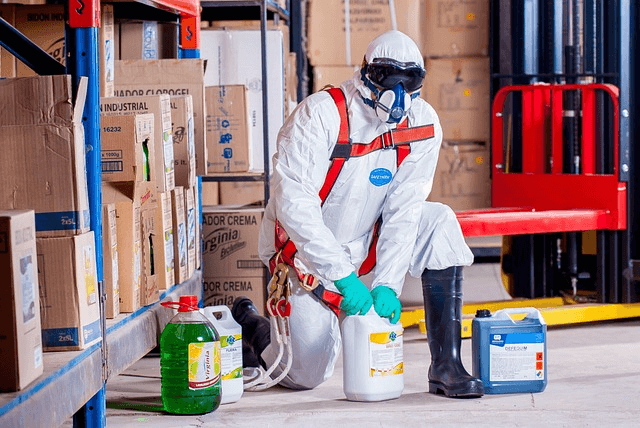Emergency spills pose significant health risks to both humans and the environment. Even trace amounts of hazardous chemicals can cause substantial harm. Any spilt waste must be cleaned up quickly, efficiently, and safely.
The spill area must be contained and decontaminated as soon as possible. Hazardous substances, even those with low toxicity, can still cause extensive pollution. Speedily implementing necessary spill response procedures can save lives.
Luckily, there are some common types of emergency spills.
Oil spills, for instance, are a common chemical spill. Their recurrence has spurred organisations like the Environmental Protection Agency to implement spill response guidelines.
Additionally, many companies stock spill cleanup materials, such as spill kits, personal protective equipment, and other spill containment items.
What Causes Emergency Spills
Emergency spills can be caused by several factors. But, there are some common reasons shared by all.
Spills are caused when a contained liquid is leaked into the environment. Leaks are common because liquids tend to go everywhere.
It’s good to keep this in mind when discussing emergency spills. Even if every safety method is taken by a waste management company, spills tend to come around at one point or another.
Given this, an emergency spill procedure is a good idea for anyone or any company working with potentially harmful liquid chemicals.
But even small chemical spills require trained emergency personnel to prevent further spread.
Knowing the common causes of emergency spills in Australia will help you develop a plan for this eventuality.
Here are 5 Common Emergency Spill Causes in Australia:
- Improper Storage
- Industrial Accident
- Human Error
- Natural Disaster
- Intentional Destruction
Let’s delve into each common type of emergency spill and provide examples.
1. Improper Storage
Common emergency spills can be caused by improper, inadequate, and aged storage facilities. This is why it is essential for anyone handling large amounts of liquids to routinely run maintenance checks.
Many waste management companies offer audits for liquid waste disposal systems. Wise business owners hire them.
These companies also have experience in dealing with emergency spills.
2. Industrial Accidents
Even with up-to-date equipment, systems can malfunction. Industrial spills of hazardous liquids pose a significant risk to human life and the environment.
Given the risk, any business dealing with hazardous or chemical liquids should consult a waste management company. They can help prevent emergency spill situations by providing industry best practice advice.
Additionally, these can implement an emergency spill response if the worst occurs.
3. Human Error
Even the most refined liquid storage systems are still at human beings’ mercy. We have an unfortunate habit of making mistakes.
Trained laboratory staff can still drop a vile of hazardous material. The difference is that they usually know what to do.
USC Dornsife has gone so far as to say that every spill is the result of human error.
It’s essential to see where gaps exist for human error to creep in. While they will always occur, they do not have to be regular.
Understanding how liquids are stored and disposed of and where humans enter the mix can help liquid waste management systems minimise this common cause of emergency spills.
4. Natural Disasters
The surrounding environments can cause emergency spills. This is quite common in Australia, where earthquakes, floods, and tropical cyclones are common.
Very little can be done to prevent natural disasters. All one can do is prepare for the worst.
A quality audit by a waste management company can help a business understand the potential weaknesses in its liquid storage and disposal systems.
These companies can implement an emergency spill response team to help decontaminate the spill area.
5. Intentional Destruction
While this last cause of emergency spills is less common, it still poses a significant risk for liquid storage and disposal.
Many reasons exist for intentional destruction, such as terrorism or insurance fraud. Such eventualities are challenging to avoid.
The critical thing to remember is that the cause of a spill should always be assessed. If intentional destruction is suspected, this audit becomes all the more essential. A system needs to understand whether or not its equipment failed.
Emergency Spill Preparation Best Practices.
Spills are common in liquid storage and disposal businesses. But they don’t just affect these businesses. If someone is driving on the road and an oil truck in front of them gets into an accident, then they have been exposed to an emergency spill.
Here are some tips for dealing with emergency spill situations:
- Do not go near the liquid. Even if it smells and looks like water, it can be very harmful and should be considered immediately dangerous.
- Assess if anyone needs medical assistance.
- Contact your local authorities. They must be made aware of potential damage to human lives and the environment, particularly if the spill is near local waterways.
- Contact a waste management company. They will have the required emergency personnel to determine what actions must be taken to handle the spill area.
- Only try to clean up the material with the correct personal protective equipment.
- Do what you can to prevent any more humans from entering the area surrounding the spill.
Here are some tips for any person or company that deals with liquids.
- Companies or personnel dealing with any liquid that can result in a chemical spill should have an emergency response team on standby.
- Invest in emergency spill kits before you need one
- Know what liquid chemicals are stored
- Take immediate action, even if it appears to be a small spill.

